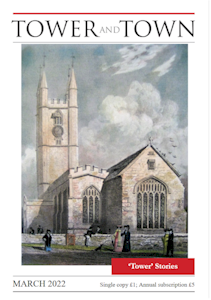

Tower and Town, March 2022 (view the full edition) (view the full edition)The Society of FriendsA Quaker woman, Mary Goodman, walked into Marlborough one market day in 1658 and urged townsfolk to ‘mind the fear of the Lord’. She was quickly hustled before the mayor, who ordered her to be flung into gaol. The next day she was tied to a pillar in the Market Place and whipped. There was a small, but committed group of Quakers in Marlborough at that time. A leader was William Hitchcock, the son of a previous mayor and a man of some wealth. He was a friend of the Society’s founder, George Fox, and of William Penn. George Fox visited Marlborough in 1656 and 1672 and spoke in William Hitchcock’s home. Although Puritanism held sway under Cromwell from 1649 to 1660, there was little tolerance of any Friend who felt moved to exhort fellow townspeople to join their faith. In 1656, Daniel Smith of Marlborough was punished for preaching to passers-by from his shop door by being imprisoned in a close dungeon for nine weeks and his friends were not allowed to come near him. Friends shunned churches, ‘steeple houses’, and after their death their bodies were closely guarded lest they be taken away to be buried in the town churchyard. In 1658, William Hitchcock gave a piece of land at Manton Corner as a burial ground. When Charles II was restored to the throne in 1660, efforts were made to force worshippers back into the Church of England and Dissenters were punished. Robert Bryant was gaoled in 1660 for refusing to take the oath of allegiance, and afterwards the local militia pulled down the walls of the burial ground. A chance for freedom came in 1681, when William Penn was granted a royal charter to set up his ‘Holy Experiment’ in the New World. In the same year Marlborough’s William Hitchcock bought 500 acres in Chester County from William Penn. His servants John and Amy Harding, and two others from Marlborough, settled there and set up a new Meeting and school in Marlborough village in Pennsylvania. Two years later George Chandler, his wife Jane and their seven children, along with John Chandler from Oare, set out for America. George died of smallpox at sea but John and Jane bought 100 acres in the new state. An end to persecution in England came in 1689, when the Act of Toleration allowed freedom of worship. Marlborough Meeting became one of the wealthiest in the county and the Society of Friends bought premises for a Meeting House behind the High Street in 1721. By the end of the century, numbers were beginning to decline and the last meeting was held there in 1821. The modern rebirth began in 1957 when Friends began meeting in houses in the town and from 1978 in the Jubilee Rooms. The present Meeting House, in The Parade, was bought in 1986 and has been in regular use ever since. Chris Wheare |